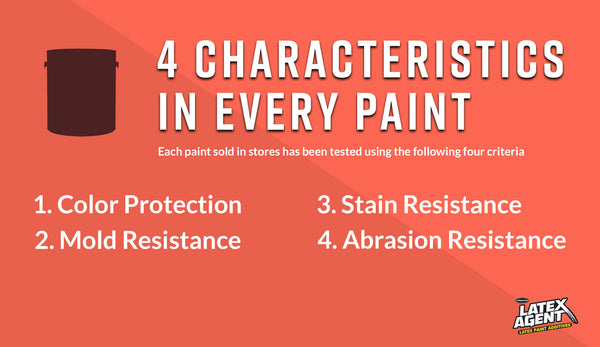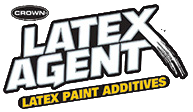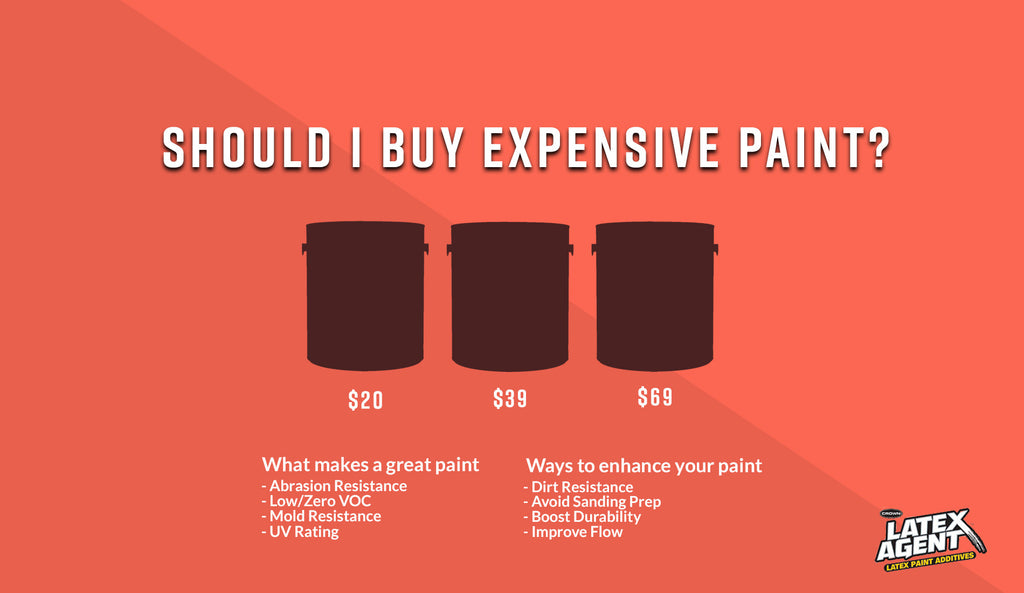Should I Buy Expensive Paint? A Paint Buyer's Guide
Posted by : Latex Agent /
Basic Paint and The Benefits of More Expensive Paints
Purchasing the right paint can be a challenge for anyone who isn't a professional painter. With multiple recognizable brand names on store shelves, each offering a variety of price points for their paint lineups, you have a choice between spending less on basic paints, or more on premium, or enhanced paints. Knowing which paint to buy and what each paint offers as benefits will help you know how much you should (or should not) spend on your next painting project. Each project presents a different challenge when it comes to selecting your paint. Every space is different.
Matching Paint Benefits to Your Space
It matters what you'll be painting.
A bathroom, for example, requires a completely different paint than exterior doors, and so on. Bathrooms require mold-resistance because of the high moisture exposure that comes with having a shower. On the other hand, exterior doors experience high UV (sun) exposure, rain, wind, hail and other weather elements that require ingredients to match those harsher outdoor elements. On the other hand, most painters agree that using cheaper and more basic paints is often perfectly fine on walls where extra benefits aren't as needed.
Another example is painting wood surfaces, like cabinets or trim. These often have stained or finished surfaces that require deep sanding, or powerful additives in order to correctly produce the right adhesion.
From trim to cabinets, each painting project is different. The more you know about paints and their various benefits, the better you'll be able to effectively set your painting budget, saving yourself from a bad painting experience, or spending too much on unnecessarily expensive paints you didn't actually need.
The Typical Cost of Basic Paint
Paint Types
There are two basic types of paint: interior and exterior. Exterior paints are typically more expensive. That's because they come packed with added ingredients to boost toughness (abrasion resistance), moisture resistance and UV color corrosion. Interior paints are typically more basic and are therefore less expensive.
Paint Finishes
From flat to high-gloss, you can choose the way you want your paint's finish to look over its lifetime. This choice is up to you and usually doesn't affect the cost of your paint. The four typical finishes are: Flat, Eggshell and Satin, Semi-Gloss and Gloss.
Basic Paint 101: What You Pay For

4 Characteristics In Every Paint
Other Paint Ingredients
Primer
Low VOC Paints
Are Expensive Paints Worth The Cost?
Excellent Alternative Methods to Enhance Paint
 Paint additives have come a long way. They can enhance paints in all the ways more expensive paints can. And they usually cost less per gallon. They can even make painting easier. Oil Bond, for example, from Latex Agent, makes painting over wood stains or finishes (like kitchen cabinets or interior trim) far easier.
Paint additives have come a long way. They can enhance paints in all the ways more expensive paints can. And they usually cost less per gallon. They can even make painting easier. Oil Bond, for example, from Latex Agent, makes painting over wood stains or finishes (like kitchen cabinets or interior trim) far easier.
Oil Bond
With Oil Bond, you can paint directly over these surfaces without sanding. It enhances the paints ability to adhere properly over previously coated surfaces that would otherwise require sanding.
Other examples include: Enhancer, Dirt Repel, and Hard Coat and Metal Bond.

Enhancer
Everyone has some challenges applying the newer, lower or zero VOC latex paints. Many of these paints are too thick and dry too quickly. Latex Enhancer is very low VOC and compliant for use anywhere in the USA. Using super-wetters and new-to- market flow and leveling agents, Enhancer improves sprayability of paint, lengthens dry time and provides a better wet edge for better painting performance.

Dirt Repel

Hard Coat
Hard Coat improves paint durability and provides a longer-lasting surface that resists nicks. Simply add it to the top coat. Works great in high-traffic areas that are exposed to extra wear and tear.

Metal Bond
Your next metal paint job is easier than ever before. Metal Bond improves paint adhesion of latex paint to metal surfaces. Simply pre-treat the surface with Metal Bond then add a dose to the first coat of paint. Even better, no primer is necessary!
Major Benefits of Paint Additives
- Produce the same or better enhancements as expensive paints
- Can treat more than one gallon of paint
- Avoid priming prep
- Avoid sanding prep
- Boost dirt and stain resistance
- Make paint more durable and longer lasting
- Extend paint dry and cure time
- Improve paint flow and leveling
- Improve sprayability of paint
Click here to find a solution that works for you.
Have you had experience you'd like to share about whether or not to purchase expensive paints? Let us know in the comments!

